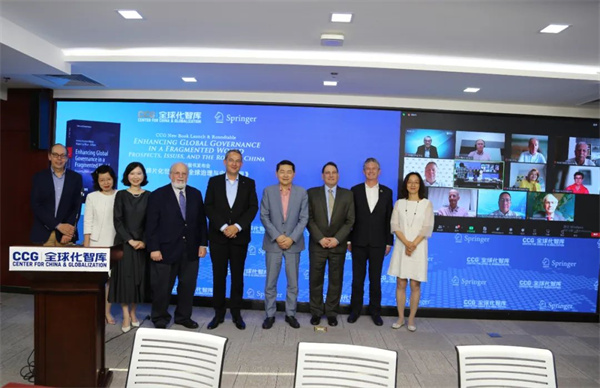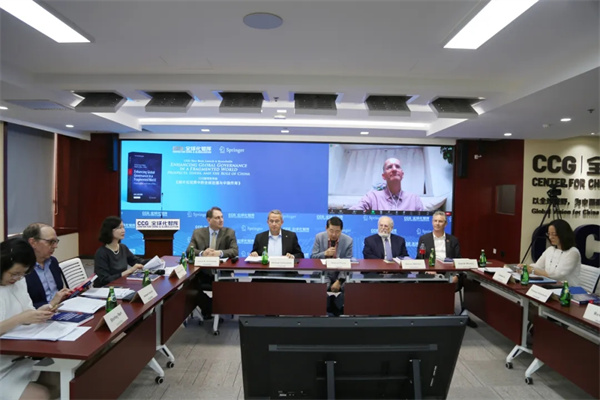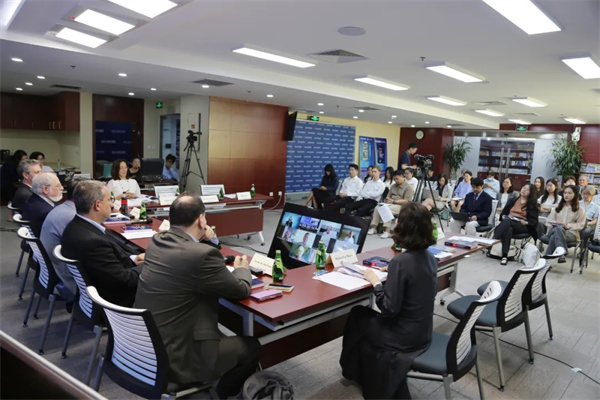CCG Book Launch: Enhancing Global Governance in a Fragmented World: Prospects, Issues, and the Role of China
August 22 , 2024
On August 22, 2024, the Center for China and Globalization (CCG) and Springer Nature jointly launched a new book,Enhancing Global Governance in a Fragmented World: Prospects, Issues, and the Role of China. During the launch and roundtable, nearly 30 experts, senior researchers and contributors to this edited volume from more than ten countries, including Spain, Pakistan, Poland, Canada, Singapore, Belgium, Germany, Australia, Italy, Croatia, India, Malaysia, and the United States, discussed recent developments and current trends in global governance, searching for solutions to global challenges and ways to create a more inclusive future. Dozens of senior diplomats, international media professionals, and experts from academic and think tank circles attended the press conference.
Editors: Henry Huiyao Wang Ph.D.&
Mabel Lu Miao Ph.D.
ISBN: 978-981-97-2557-1
Published in June 2024
Publisher:Springer Nature
Access to the book:
https://link.springer.com/book/10.1007/978-981-97-2558-8
Enhancing Global Governance in a Fragmented World collects the combined wisdom of 30 leading figures from the global think tank community that emphasize a common, central theme through all of the 25 essays in this book, which is the need for a more universal, inclusive and multilateral approach to reforming global governance.
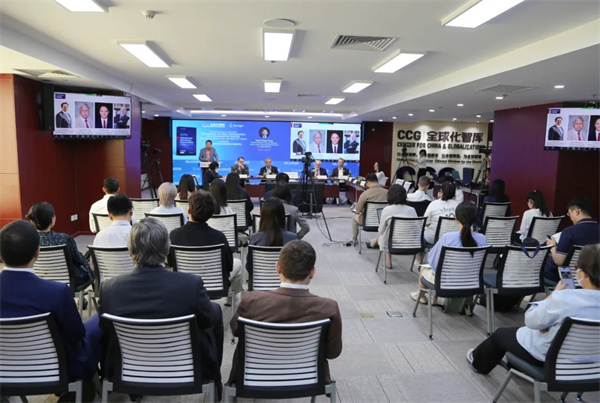 CCG’s Secretary-General Dr. Mabel Lu Miao and President Dr. Henry Huiyao Wang, who also served as the volume’s co-editors, moderated the proceedings. William Achauer, Springer Nature’s Editorial Director for Business, Economics, Political Sciences and Law, joined online to deliver an opening address, while Leana Li, Springer Nature Group’s Regional Director for Books in China, provided additional remarks. The launch included a book presentation by Dr. Henry Huiyao Wang and culminated in a roundtable discussion moderated by both Dr. Wang and Dr. Miao, bringing together distinguished guest speakers to explore the book’s themes of global governance in today’s complex geopolitical landscape.
CCG’s Secretary-General Dr. Mabel Lu Miao and President Dr. Henry Huiyao Wang, who also served as the volume’s co-editors, moderated the proceedings. William Achauer, Springer Nature’s Editorial Director for Business, Economics, Political Sciences and Law, joined online to deliver an opening address, while Leana Li, Springer Nature Group’s Regional Director for Books in China, provided additional remarks. The launch included a book presentation by Dr. Henry Huiyao Wang and culminated in a roundtable discussion moderated by both Dr. Wang and Dr. Miao, bringing together distinguished guest speakers to explore the book’s themes of global governance in today’s complex geopolitical landscape.
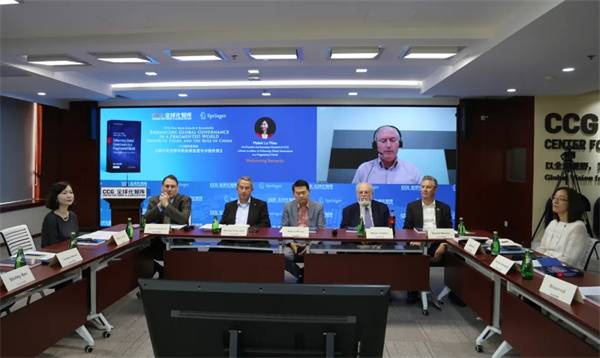 William Achauer, Editorial Director for Business, Economics, Political Sciences and Law of Springer Nature, delivered the opening remarks. He mentioned that this book explores the significant role think tanks play in global governance, particularly against the backdrop of increasingly complex global politics. As an open-access publication, the book has already achieved substantial download numbers, and future readership is expected to continue growing. Finally, he extended his congratulations to Dr. Henry Huiyao Wang and Dr. Mabel Lu Miao and expressed gratitude to think tank experts from around the world for their valuable contributions to this book.
William Achauer, Editorial Director for Business, Economics, Political Sciences and Law of Springer Nature, delivered the opening remarks. He mentioned that this book explores the significant role think tanks play in global governance, particularly against the backdrop of increasingly complex global politics. As an open-access publication, the book has already achieved substantial download numbers, and future readership is expected to continue growing. Finally, he extended his congratulations to Dr. Henry Huiyao Wang and Dr. Mabel Lu Miao and expressed gratitude to think tank experts from around the world for their valuable contributions to this book.
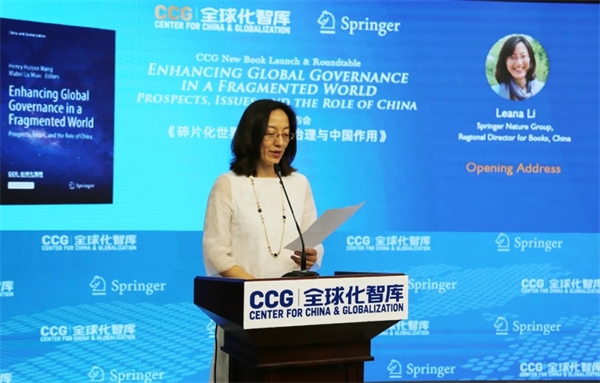 Leana Li, Regional Director for Books for China of Springer Nature Group, emphasized in her opening remarks that this new book has been published against the backdrop of multiple global crises. It not only provides in-depth analysis of current issues but also offers practical solutions. She noted that the decision to publish it as an open-access book was made to ensure that these important ideas and solutions could be widely disseminated, not limited to the academic community or policymakers, but made accessible to the global public to promote broader dialogue and collaboration. Finally, she urged everyone to deeply reflect on the intellectual challenges presented in the book and to work together to improve global governance.
Leana Li, Regional Director for Books for China of Springer Nature Group, emphasized in her opening remarks that this new book has been published against the backdrop of multiple global crises. It not only provides in-depth analysis of current issues but also offers practical solutions. She noted that the decision to publish it as an open-access book was made to ensure that these important ideas and solutions could be widely disseminated, not limited to the academic community or policymakers, but made accessible to the global public to promote broader dialogue and collaboration. Finally, she urged everyone to deeply reflect on the intellectual challenges presented in the book and to work together to improve global governance.
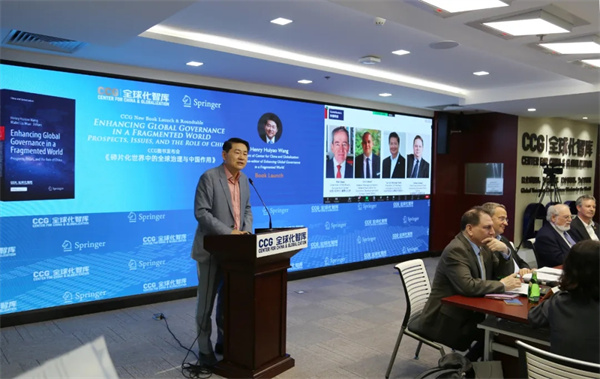 During the book launch session, Dr. Henry Huiyao Wang, President of Center for China and Globalization and volume co-editor of Enhancing Global Governance in a Fragmented World, elaborated on the book’s development process and chapter content, emphasizing its timeliness and significance. He mentioned that the chapters will be freely accessible to the public and academic communities to broaden its impact. To date, the think tank has successfully launched several similar open-access publications that have garnered widespread downloads and attention. He noted that the new book brings together the insights of 30 leading figures from global think tanks and includes 25 articles, calling for enhanced global cooperation and inclusive governance to address these challenges and improve the global governance system. The book also discusses the roles of different countries in global governance, with a particular focus on China’s contributions to advancing global governance modernization and strengthening international cooperation.
During the book launch session, Dr. Henry Huiyao Wang, President of Center for China and Globalization and volume co-editor of Enhancing Global Governance in a Fragmented World, elaborated on the book’s development process and chapter content, emphasizing its timeliness and significance. He mentioned that the chapters will be freely accessible to the public and academic communities to broaden its impact. To date, the think tank has successfully launched several similar open-access publications that have garnered widespread downloads and attention. He noted that the new book brings together the insights of 30 leading figures from global think tanks and includes 25 articles, calling for enhanced global cooperation and inclusive governance to address these challenges and improve the global governance system. The book also discusses the roles of different countries in global governance, with a particular focus on China’s contributions to advancing global governance modernization and strengthening international cooperation.
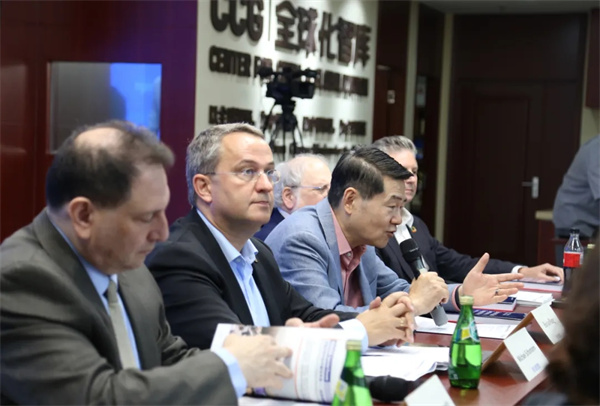 The roundtable discussion successfully attracted more than 20 experts and scholars from various fields who actively participated both online and offline. These participants included senior experts from renowned think tanks, leading researchers from top universities, and contributing authors of the new book. They gathered to engage in an in-depth discussion centered on the theme of Global Governance in a Fragmented World: The Role of China, exploring the challenges and opportunities facing global governance in the current complex and ever-changing international landscape, as well as the significant role China plays in this context.
The roundtable discussion successfully attracted more than 20 experts and scholars from various fields who actively participated both online and offline. These participants included senior experts from renowned think tanks, leading researchers from top universities, and contributing authors of the new book. They gathered to engage in an in-depth discussion centered on the theme of Global Governance in a Fragmented World: The Role of China, exploring the challenges and opportunities facing global governance in the current complex and ever-changing international landscape, as well as the significant role China plays in this context.
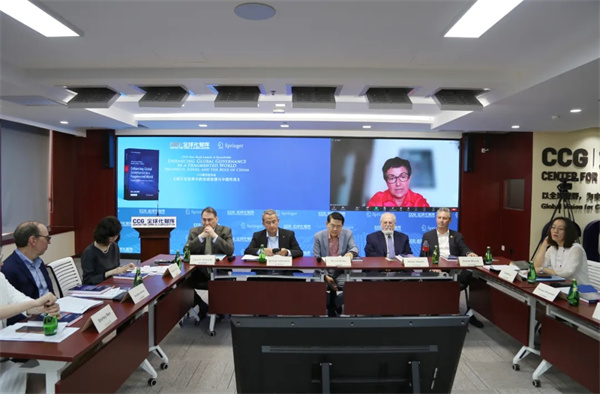 Arancha González Laya, Dean of Paris School of International Affairs (PSIA) of Sciences Po, pointed out that this seminar is particularly important against the backdrop of a global situation characterized by risks, fragmentation, divergent priorities, and strategic competition. She believes that although global governance is still largely dominated by sovereign states, international cooperation remains crucial, especially in areas such as trade, supply chains, and logistics solutions. She also mentioned that the international order is undergoing adjustments, highlighting the importance of strengthening global governance capabilities in this context.
Arancha González Laya, Dean of Paris School of International Affairs (PSIA) of Sciences Po, pointed out that this seminar is particularly important against the backdrop of a global situation characterized by risks, fragmentation, divergent priorities, and strategic competition. She believes that although global governance is still largely dominated by sovereign states, international cooperation remains crucial, especially in areas such as trade, supply chains, and logistics solutions. She also mentioned that the international order is undergoing adjustments, highlighting the importance of strengthening global governance capabilities in this context.
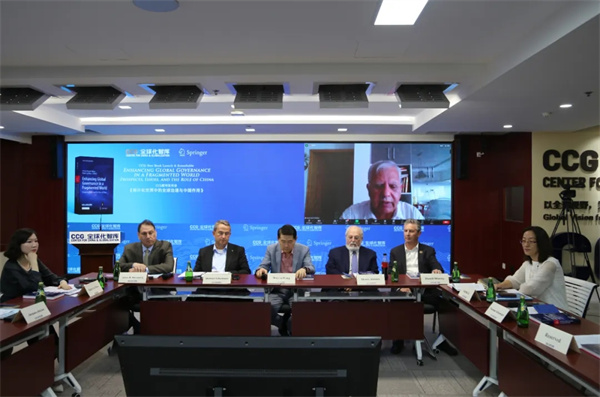 Zamir Ahmed Awan, Founding Chair of Global Silk Route Research Alliance (GSRRA) and Formoer Counselor at the Pakistani Embassy in China, expressed genuine understanding and appreciation for China’s governance model. He emphasized that a key feature of China’s governance is the government’s proactive approach in collecting feedback from stakeholders during the policy implementation process and making adjustments and improvements based on that feedback. Additionally, he noted that China not only continuously innovates in its domestic governance but also actively learns from other countries, including drawing lessons from Middle Eastern and African nations. He believes that this spirit of open learning and continuous improvement is one of the main reasons for China’s rapid development.
Zamir Ahmed Awan, Founding Chair of Global Silk Route Research Alliance (GSRRA) and Formoer Counselor at the Pakistani Embassy in China, expressed genuine understanding and appreciation for China’s governance model. He emphasized that a key feature of China’s governance is the government’s proactive approach in collecting feedback from stakeholders during the policy implementation process and making adjustments and improvements based on that feedback. Additionally, he noted that China not only continuously innovates in its domestic governance but also actively learns from other countries, including drawing lessons from Middle Eastern and African nations. He believes that this spirit of open learning and continuous improvement is one of the main reasons for China’s rapid development.
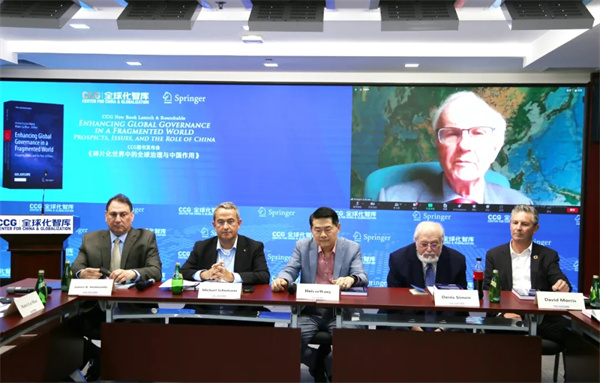 Grzegorz Kołodko, Director of TIGER—Transformation of Integration and Globalization Economic Research of Kozminski University, noted that recently, the European Parliament elections have concluded, and a new EU leadership is currently being formed. He believes that in the future, Europe will be committed to developing pragmatic and productive relationships with the United States, China, and other countries. At the same time, he is observing with great interest the relationships between China and other Asian countries, as these relationships will have a profound impact on the global stage.
Grzegorz Kołodko, Director of TIGER—Transformation of Integration and Globalization Economic Research of Kozminski University, noted that recently, the European Parliament elections have concluded, and a new EU leadership is currently being formed. He believes that in the future, Europe will be committed to developing pragmatic and productive relationships with the United States, China, and other countries. At the same time, he is observing with great interest the relationships between China and other Asian countries, as these relationships will have a profound impact on the global stage.
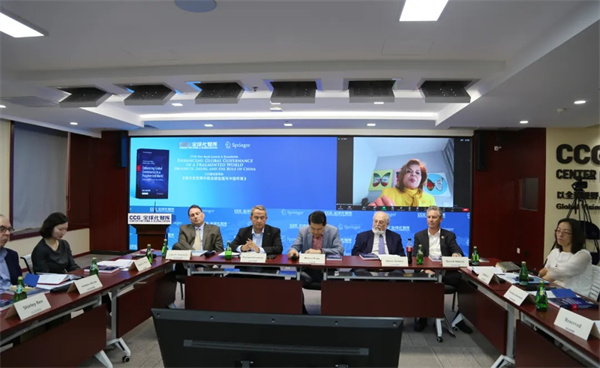 Mehri Madarshahi, Honorary Professor of Institute for Public Policy (IPP) of South China University for Technology, said that global governance and multilateralism are currently facing severe challenges. The COVID-19 pandemic has triggered significant mistrust within the international community, and this distrust may have long-term implications for global governance and multilateralism. The United States has restricted the export of high-end technology and semiconductors to curb China’s development, which has further deepened the divide between the East and the West. Additionally, the global situation is gradually moving towards a Cold War-like state, with a growing focus on militarization overshadowing attention to economic development, climate change, and other global issues. This situation has caused certain groups to become deeply disillusioned with the process of globalization and turn towards extreme nationalism.
Mehri Madarshahi, Honorary Professor of Institute for Public Policy (IPP) of South China University for Technology, said that global governance and multilateralism are currently facing severe challenges. The COVID-19 pandemic has triggered significant mistrust within the international community, and this distrust may have long-term implications for global governance and multilateralism. The United States has restricted the export of high-end technology and semiconductors to curb China’s development, which has further deepened the divide between the East and the West. Additionally, the global situation is gradually moving towards a Cold War-like state, with a growing focus on militarization overshadowing attention to economic development, climate change, and other global issues. This situation has caused certain groups to become deeply disillusioned with the process of globalization and turn towards extreme nationalism.
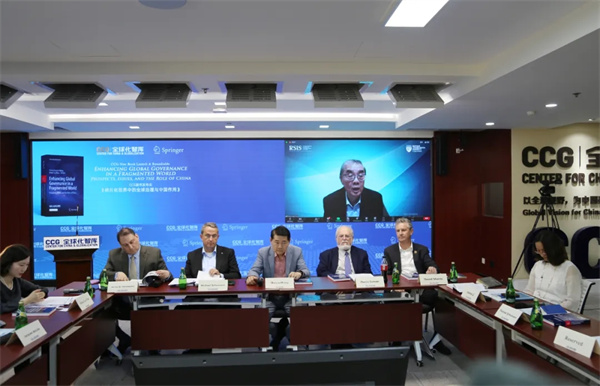 Keng Yong Ong, Executive Deputy Chairman of S. Rajaratnam School of International Studies (RSIS) at Nanyang Technological University (NTU), stated that to strengthen global governance, it is first necessary to establish new habits of cooperation and coexistence, which means having the willingness to compromise and make concessions while avoiding the destruction of existing achievements. Additionally, it is crucial to emphasize the importance of mutual trust, mutual respect, and mutual benefit, and to adhere to the common principles, purposes, values, and norms established in the United Nations Charter and other international documents. Disputes are inevitable, and to resolve them, it is essential to focus on promoting dialogue, cooperation, and trust-building measures. As the level of global fragmentation increases, global governance becomes more urgent, and its realization depends on establishing new cooperative habits. Therefore, continuous effort is needed to learn how to achieve coexistence.
Keng Yong Ong, Executive Deputy Chairman of S. Rajaratnam School of International Studies (RSIS) at Nanyang Technological University (NTU), stated that to strengthen global governance, it is first necessary to establish new habits of cooperation and coexistence, which means having the willingness to compromise and make concessions while avoiding the destruction of existing achievements. Additionally, it is crucial to emphasize the importance of mutual trust, mutual respect, and mutual benefit, and to adhere to the common principles, purposes, values, and norms established in the United Nations Charter and other international documents. Disputes are inevitable, and to resolve them, it is essential to focus on promoting dialogue, cooperation, and trust-building measures. As the level of global fragmentation increases, global governance becomes more urgent, and its realization depends on establishing new cooperative habits. Therefore, continuous effort is needed to learn how to achieve coexistence.
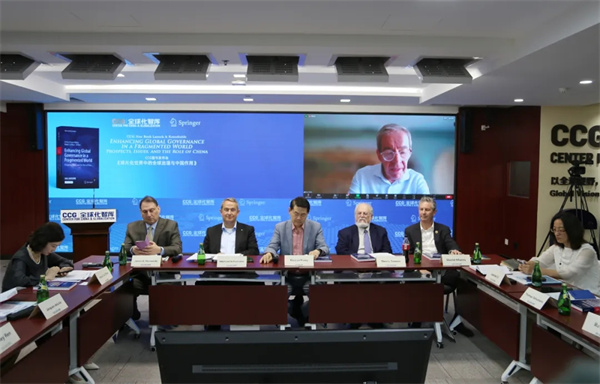 Piet Steel, Chairman of the Board of Europe Asia Center and Former Consul General of Belgium in Hong Kong, first expressed his sincere admiration for the achievements of CCG, noting that bringing together perspectives from around the world on such a controversial topic is indeed a remarkable accomplishment. He emphasized that if we are to rebuild a multilateral world, the WTO and its multilateral trade framework are absolutely essential. Furthermore, China plays a pivotal role in this effort. With the ongoing Russia-Ukraine war, as a European scholar, he is eagerly anticipating constructive solutions from China to help resolve this issue.
Piet Steel, Chairman of the Board of Europe Asia Center and Former Consul General of Belgium in Hong Kong, first expressed his sincere admiration for the achievements of CCG, noting that bringing together perspectives from around the world on such a controversial topic is indeed a remarkable accomplishment. He emphasized that if we are to rebuild a multilateral world, the WTO and its multilateral trade framework are absolutely essential. Furthermore, China plays a pivotal role in this effort. With the ongoing Russia-Ukraine war, as a European scholar, he is eagerly anticipating constructive solutions from China to help resolve this issue.
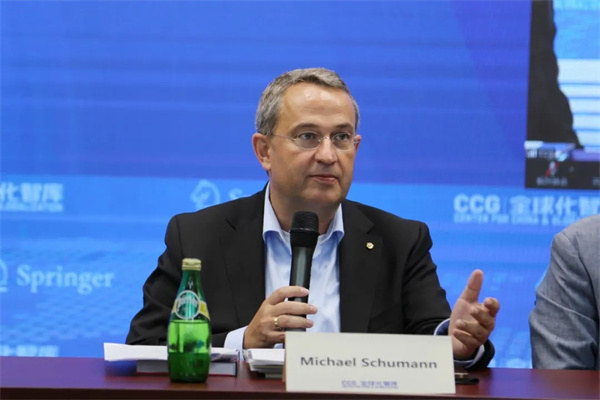 Michael Schumann, Chairman of the Board of Federal Association for Economic Development and Foreign Trade (BWA), began by expressing his gratitude to CCG for inviting him to be a co-author and for setting up this platform for the book launch. He stated that economic diplomacy plays a crucial role in global governance, serving as an important bridge for building understanding and cooperation between nations. Schuman called for recognizing the central role of economic diplomacy in shaping an inclusive and collaborative world when discussing the future of global governance. He emphasized the importance of ongoing cooperation and dialogue and encouraged countries to draw on historical examples of scientific and economic collaboration to work together towards creating a more resilient, prosperous, and inclusive international community.
Michael Schumann, Chairman of the Board of Federal Association for Economic Development and Foreign Trade (BWA), began by expressing his gratitude to CCG for inviting him to be a co-author and for setting up this platform for the book launch. He stated that economic diplomacy plays a crucial role in global governance, serving as an important bridge for building understanding and cooperation between nations. Schuman called for recognizing the central role of economic diplomacy in shaping an inclusive and collaborative world when discussing the future of global governance. He emphasized the importance of ongoing cooperation and dialogue and encouraged countries to draw on historical examples of scientific and economic collaboration to work together towards creating a more resilient, prosperous, and inclusive international community.
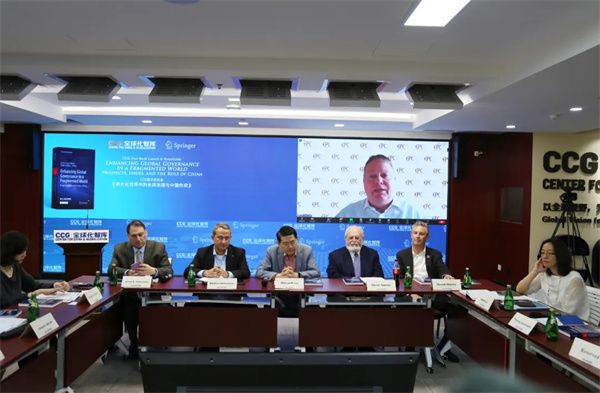 Fabian Zuleeg, Chief Executive and Chief Economist of European Policy Centre, expressed his gratitude for the opportunity to collaborate with CCG and contribute to the new book. He pointed out the current paradox: there is a greater need for multilateralism than ever before, yet multilateral cooperation is becoming increasingly difficult. The global order is becoming more chaotic and fragmented, with China clearly playing a key role in the future global order. As one of the superpowers, the United States also bears significant responsibility, and all middle powers have their respective obligations. Every country must contribute to this global system, which means everyone needs to adhere to global rules. This requirement applies not only to the political sphere but also to the economic realm.
Fabian Zuleeg, Chief Executive and Chief Economist of European Policy Centre, expressed his gratitude for the opportunity to collaborate with CCG and contribute to the new book. He pointed out the current paradox: there is a greater need for multilateralism than ever before, yet multilateral cooperation is becoming increasingly difficult. The global order is becoming more chaotic and fragmented, with China clearly playing a key role in the future global order. As one of the superpowers, the United States also bears significant responsibility, and all middle powers have their respective obligations. Every country must contribute to this global system, which means everyone needs to adhere to global rules. This requirement applies not only to the political sphere but also to the economic realm.
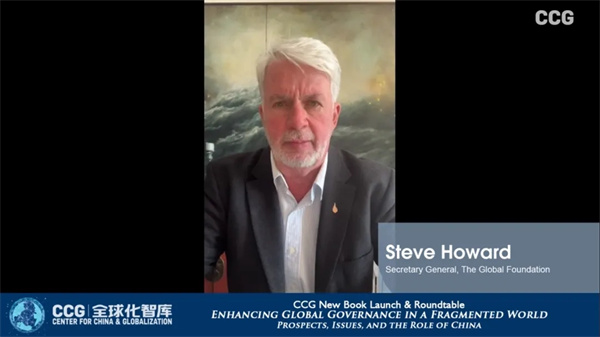 Steve Howard, Secretary General of The Global Foundation, congratulated the launch of the new book via video and paid tribute to Dr. Henry Huiyao Wang and Dr. Mabel Lu Miao and CCG for their outstanding contributions. He argued that the world is currently facing a divisive trend, however, in the face of global threats such as climate and environmental change, co-operation is the only way out of the problem. He believes China plays a central pivot role in global governance and sustainable development. At the same time, he also called on governments, the private sector, think tanks, academia and civil society to engage in global governance and sustainable development concertedly, and to promote climate commitment and practical action by uniting contributors in various fields worldwide.
Steve Howard, Secretary General of The Global Foundation, congratulated the launch of the new book via video and paid tribute to Dr. Henry Huiyao Wang and Dr. Mabel Lu Miao and CCG for their outstanding contributions. He argued that the world is currently facing a divisive trend, however, in the face of global threats such as climate and environmental change, co-operation is the only way out of the problem. He believes China plays a central pivot role in global governance and sustainable development. At the same time, he also called on governments, the private sector, think tanks, academia and civil society to engage in global governance and sustainable development concertedly, and to promote climate commitment and practical action by uniting contributors in various fields worldwide.
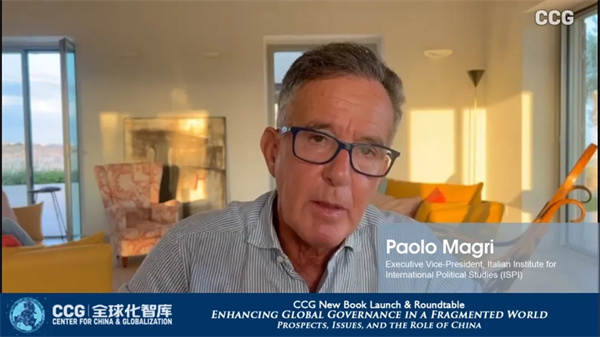 Paolo Magri, Executive Vice-President of Italian Institute for International Political Studies (ISPI), pointed out that globalisation and multilateralism are in crisis in the current turbulent global situation, with a growing geopolitical divide between North and South. However, globalisation and multilateralism still had a raison d’être, as the economies of the North and the South remained highly interdependent. He called for the bonding role of rationalism and interdependence, strengthening North-South dialogue and cooperation, and promoting multilateralism and globalisation through international organisations such as the WTO and the G20.
Paolo Magri, Executive Vice-President of Italian Institute for International Political Studies (ISPI), pointed out that globalisation and multilateralism are in crisis in the current turbulent global situation, with a growing geopolitical divide between North and South. However, globalisation and multilateralism still had a raison d’être, as the economies of the North and the South remained highly interdependent. He called for the bonding role of rationalism and interdependence, strengthening North-South dialogue and cooperation, and promoting multilateralism and globalisation through international organisations such as the WTO and the G20.
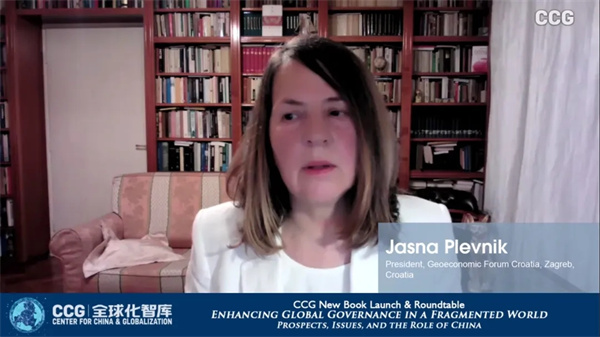 Jasna Plevnik, President of Geoeconomic Forum Croatia, expressed her gratitude for the publication of the new book and shared the three main points of her essay in the book. First, a new global order has not been established, and the future world landscape depends on China and the United States. Second, China and the United States have very different development paths in economic globalisation and geopolitics, with China promoting global peace, stability and modernisation through multilateral initiatives (such as the AIIB), while the United States may see China’s development as a reason for confrontation. Third, if the next decade is dominated by geopolitical rivalries, the world will be plunged into a period of tension and uncertainty. She called on China and the US to change the world through co-operation rather than conflict and argued that military conflict between China and the US remains unlikely in the future.
Jasna Plevnik, President of Geoeconomic Forum Croatia, expressed her gratitude for the publication of the new book and shared the three main points of her essay in the book. First, a new global order has not been established, and the future world landscape depends on China and the United States. Second, China and the United States have very different development paths in economic globalisation and geopolitics, with China promoting global peace, stability and modernisation through multilateral initiatives (such as the AIIB), while the United States may see China’s development as a reason for confrontation. Third, if the next decade is dominated by geopolitical rivalries, the world will be plunged into a period of tension and uncertainty. She called on China and the US to change the world through co-operation rather than conflict and argued that military conflict between China and the US remains unlikely in the future.
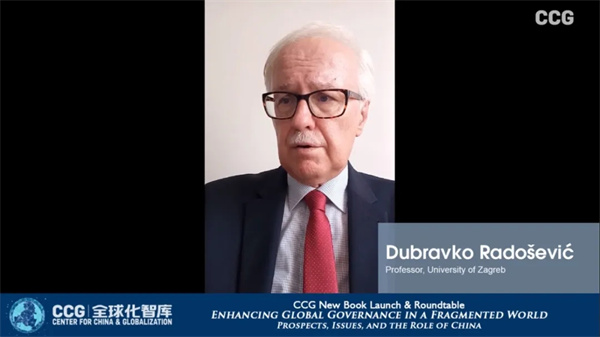 Dubravko Radošević, Professor of University of Zagreb, expressed his gratitude for the invitation to the CCG’s new book project. He noted that the global economy and China are facing rising geopolitical and geo-economic risks, which makes it necessary for policymakers to make strategic adjustments to cope with uncertainty. He stressed that capital account liberalisation was the best policy option for China to respond to changes in the global economy, which was the core argument of his book article. He argues that China needs to respond to the current multiple crises through complex policies, and that despite the risks, the internationalisation of the RMB is accelerating and will continue to drive economic reforms. At the same time, China’s economic reforms need to be carried out in a steady and orderly manner and maintain internal and external openness and financial system stability.
Dubravko Radošević, Professor of University of Zagreb, expressed his gratitude for the invitation to the CCG’s new book project. He noted that the global economy and China are facing rising geopolitical and geo-economic risks, which makes it necessary for policymakers to make strategic adjustments to cope with uncertainty. He stressed that capital account liberalisation was the best policy option for China to respond to changes in the global economy, which was the core argument of his book article. He argues that China needs to respond to the current multiple crises through complex policies, and that despite the risks, the internationalisation of the RMB is accelerating and will continue to drive economic reforms. At the same time, China’s economic reforms need to be carried out in a steady and orderly manner and maintain internal and external openness and financial system stability.
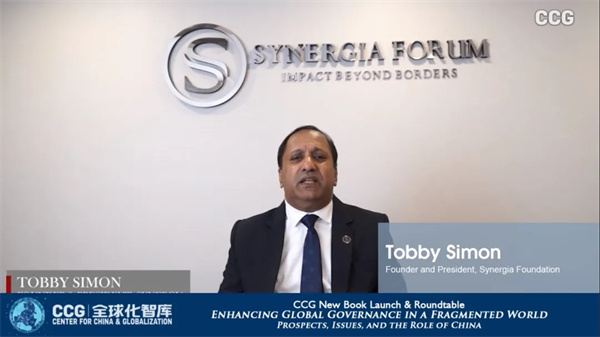 Tobby Simon, Founder and President of Synergia Foundation, expressed his gratitude to Dr. Henry Huiyao Wang for his invitation to participate in the new book. He recognised China’s active role in supporting multipolarity and the global governance system, argued that China can continue to raise its profile as a reliable and ethical global leader, and echoed President Xi Jinping’s vision of a fairer and more equitable global governance. His essays in the new book focus on three aspects of China: global supply chains, global environmental governance, and artificial intelligence and emerging technologies. He argues that China is actively exploring governance models in these areas, such as the ‘G+’ concept that advocates cooperation and decentralisation between governments, NGOs, private enterprises, etc., which are useful in adapting to the trend of fragmentation in global governance.
Tobby Simon, Founder and President of Synergia Foundation, expressed his gratitude to Dr. Henry Huiyao Wang for his invitation to participate in the new book. He recognised China’s active role in supporting multipolarity and the global governance system, argued that China can continue to raise its profile as a reliable and ethical global leader, and echoed President Xi Jinping’s vision of a fairer and more equitable global governance. His essays in the new book focus on three aspects of China: global supply chains, global environmental governance, and artificial intelligence and emerging technologies. He argues that China is actively exploring governance models in these areas, such as the ‘G+’ concept that advocates cooperation and decentralisation between governments, NGOs, private enterprises, etc., which are useful in adapting to the trend of fragmentation in global governance.
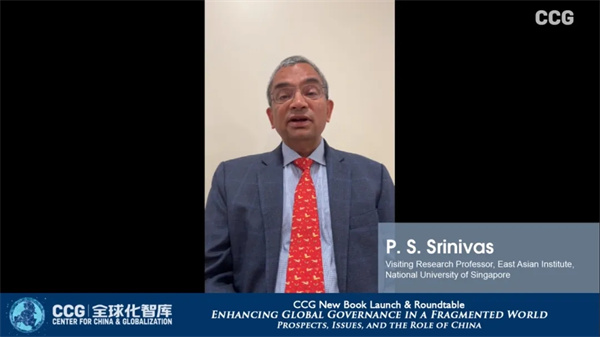 P. S. Srinivas, Visiting Research Professor of East Asian Institute of National University of Singapore, expressed his gratitude for the invitation to the CCG book launch and roundtable. He said his article in the book focuses on China’s evolving role in the MDBs and covers topics such as multilateralism, global economy and financial governance. He noted that China has a long history and close ties with the MDBs, and that China is playing an increasingly important role in them. China had actively drawn on the experience of the World Bank and other institutions as a model, leading the establishment of the Asian Infrastructure Investment Bank (AIIB) and the New Development Bank (NDB), and endeavouring to promote the reform and development of the global financial architecture through long-term investment and constructive engagement. He also believes that China can expand multilateral banks’ assistance to developing countries to help them address challenges such as climate change, post-disaster reconstruction and food security, and create positive conditions for global economic governance in a fragmented world.
P. S. Srinivas, Visiting Research Professor of East Asian Institute of National University of Singapore, expressed his gratitude for the invitation to the CCG book launch and roundtable. He said his article in the book focuses on China’s evolving role in the MDBs and covers topics such as multilateralism, global economy and financial governance. He noted that China has a long history and close ties with the MDBs, and that China is playing an increasingly important role in them. China had actively drawn on the experience of the World Bank and other institutions as a model, leading the establishment of the Asian Infrastructure Investment Bank (AIIB) and the New Development Bank (NDB), and endeavouring to promote the reform and development of the global financial architecture through long-term investment and constructive engagement. He also believes that China can expand multilateral banks’ assistance to developing countries to help them address challenges such as climate change, post-disaster reconstruction and food security, and create positive conditions for global economic governance in a fragmented world.
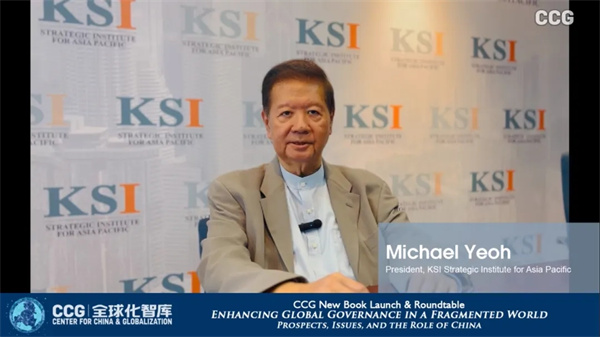 Michael Yeoh, President of KSI Strategic Institute for Asia Pacific, congratulated CCG for yet another initiative and contribution to the field of knowledge. He noted that the global order is shifting from being centred on the United States to being dominated by ASEAN and BRICS economies such as China and India, and that economic cooperation among Asian countries is becoming more important. According to him, the world is now facing four major challenges – indebtedness, technological disruption, digital transformation and demographics – and noted that trade and investment, regional economic integration, inclusive and sustainable development, and promoting digital transformation are ASEAN’s strategic priorities. He called on China and ASEAN to strengthen their cooperation and jointly lead an Asian future that was driven by the knowledge economy and innovation, inclusive and sustainable, peaceful and prosperous.
Michael Yeoh, President of KSI Strategic Institute for Asia Pacific, congratulated CCG for yet another initiative and contribution to the field of knowledge. He noted that the global order is shifting from being centred on the United States to being dominated by ASEAN and BRICS economies such as China and India, and that economic cooperation among Asian countries is becoming more important. According to him, the world is now facing four major challenges – indebtedness, technological disruption, digital transformation and demographics – and noted that trade and investment, regional economic integration, inclusive and sustainable development, and promoting digital transformation are ASEAN’s strategic priorities. He called on China and ASEAN to strengthen their cooperation and jointly lead an Asian future that was driven by the knowledge economy and innovation, inclusive and sustainable, peaceful and prosperous.
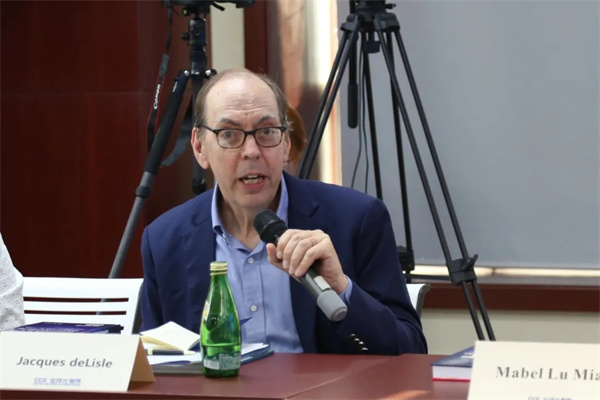 Jacques deLisle, Director of Center for the Study of Contemporary China of University of Pennsylvania, expressed his appreciation for the content of the book, stating that the discussions on international relations and topics related to China are very valuable, offering helpful perspectives for addressing the current complex international situation. He noted that, given the multiple challenges the world is facing today, such as the COVID-19 pandemic, climate change, and the rebound of globalization, the need for multilateral institutions and international organizations to address these global challenges has become particularly important. He believes that changes in the international order have weakened multilateralism and economic security. Despite these challenges, there are also many solutions and opportunities that can be leveraged to address these issues through innovations in policy, business, and institutions.
Jacques deLisle, Director of Center for the Study of Contemporary China of University of Pennsylvania, expressed his appreciation for the content of the book, stating that the discussions on international relations and topics related to China are very valuable, offering helpful perspectives for addressing the current complex international situation. He noted that, given the multiple challenges the world is facing today, such as the COVID-19 pandemic, climate change, and the rebound of globalization, the need for multilateral institutions and international organizations to address these global challenges has become particularly important. He believes that changes in the international order have weakened multilateralism and economic security. Despite these challenges, there are also many solutions and opportunities that can be leveraged to address these issues through innovations in policy, business, and institutions.
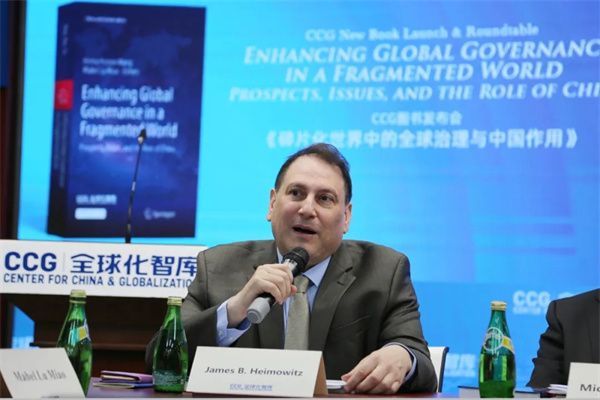 James Heimowitz, Founder of JBH Consulting Ltd and former President of China Institute in New York, noted that this event brought together perspectives from various fields, presenting a multi-angled view of the current international situation through in-depth discussions. He stated that neither superpowers like the United States nor smaller countries can ignore China’s critical role and influence in the future of the global landscape. He expressed his gratitude to Dr. Henry Huiyao Wang and Dr. Mabel Lu Miao for their efforts in establishing the framework and structure for this discussion. He pointed out that in today’s world, institutions like CCG are particularly important as they serve as facilitators, helping the world better understand China’s strategic direction.
James Heimowitz, Founder of JBH Consulting Ltd and former President of China Institute in New York, noted that this event brought together perspectives from various fields, presenting a multi-angled view of the current international situation through in-depth discussions. He stated that neither superpowers like the United States nor smaller countries can ignore China’s critical role and influence in the future of the global landscape. He expressed his gratitude to Dr. Henry Huiyao Wang and Dr. Mabel Lu Miao for their efforts in establishing the framework and structure for this discussion. He pointed out that in today’s world, institutions like CCG are particularly important as they serve as facilitators, helping the world better understand China’s strategic direction.
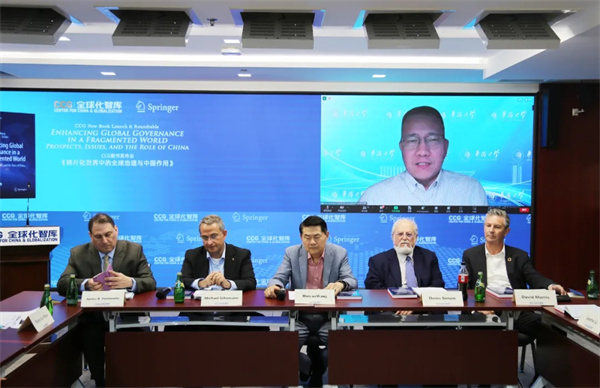 Hongyu Lin, Vice President of Huaqiao University, provided an in-depth analysis of China’s role in the global economy, the challenges it faces, and its strategies for addressing them. He began by expressing his gratitude to CCG for organizing this important event and emphasized China’s positive role in maintaining global economic stability and development. When discussing international cooperation, he highlighted that global initiatives proposed by China, such as the Global Development Initiative (GDI) and the Global Civilization Initiative (GCI), are of great significance for building new major power relations and promoting global cooperation. In conclusion, he stated that China is taking a series of measures to further open its economy, not only to boost domestic economic growth but also to share development opportunities with countries worldwide and jointly tackle global challenges.
Hongyu Lin, Vice President of Huaqiao University, provided an in-depth analysis of China’s role in the global economy, the challenges it faces, and its strategies for addressing them. He began by expressing his gratitude to CCG for organizing this important event and emphasized China’s positive role in maintaining global economic stability and development. When discussing international cooperation, he highlighted that global initiatives proposed by China, such as the Global Development Initiative (GDI) and the Global Civilization Initiative (GCI), are of great significance for building new major power relations and promoting global cooperation. In conclusion, he stated that China is taking a series of measures to further open its economy, not only to boost domestic economic growth but also to share development opportunities with countries worldwide and jointly tackle global challenges.
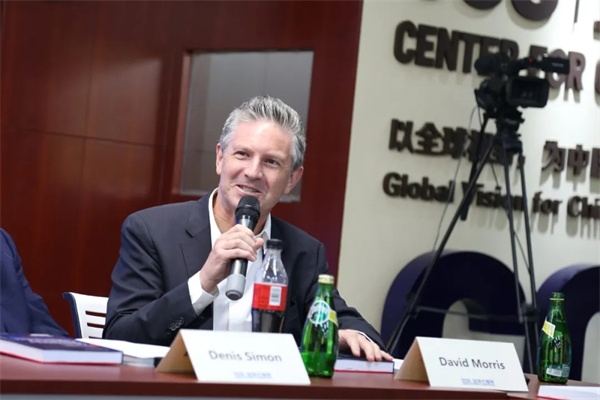 David Morris, President and Executive Director of 1EarthVillage and Former Vice Chair of the United Nations Sustainable Business Network for Asia Pacific, began by congratulating CCG on the successful launch of the new book. He pointed out that the world today is undergoing a profound shift from a unipolar to a multipolar order, a transformation that is not only limited to the political and economic spheres but is also reshaping the way people think and the foundations of civilization. In light of this, he called for abandoning the long-held Eurocentric mindset and embracing a more open and inclusive worldview—one that sees China and the countries of the Global South as indispensable members of a global community.
David Morris, President and Executive Director of 1EarthVillage and Former Vice Chair of the United Nations Sustainable Business Network for Asia Pacific, began by congratulating CCG on the successful launch of the new book. He pointed out that the world today is undergoing a profound shift from a unipolar to a multipolar order, a transformation that is not only limited to the political and economic spheres but is also reshaping the way people think and the foundations of civilization. In light of this, he called for abandoning the long-held Eurocentric mindset and embracing a more open and inclusive worldview—one that sees China and the countries of the Global South as indispensable members of a global community.
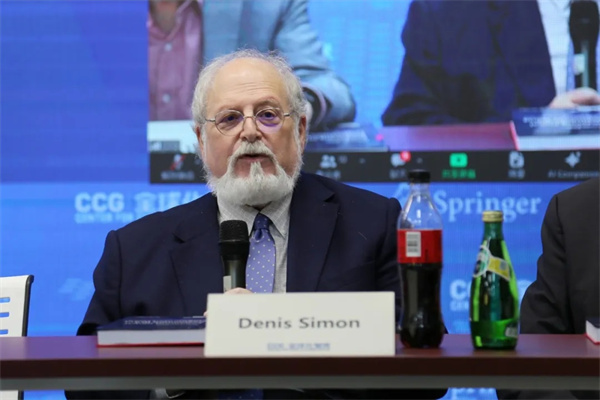 Denis Simon, Chair of Alliance of Global Talent Organizations (AGTO) and former Executive Vice Chancellor of Duke Kunshan University, reflected on his academic experience studying international relations at the University of California, Berkeley, and offered unique insights into global governance issues. Dennis believes that, today, even though countries often find themselves in security dilemmas when facing global challenges, the establishment of multilateral cooperation mechanisms is key to achieving global peace and stability. He emphasized that although security dilemmas remain a significant challenge in global governance, through multilateral dialogue and cooperation, countries around the world can gradually build trust and achieve mutually beneficial outcomes.
Additionally, Emanuel Pastreich, President of The Asia Institute, also participated in the meeting online.
Amidst a vibrant atmosphere and in-depth exchanges, the CCG book launch concluded successfully. The event, which included both the book launch and a roundtable discussion, witnessed a collision of ideas and blending of wisdom. Experts engaged in productive discussions on key issues presented in the book, ranging from the macro international landscape to specific policy recommendations. During the meeting, attendees widely acknowledged that CCG’s work in research and publishing not only provides valuable references for academia and policymakers but also plays a significant role in promoting global communication and cooperation.
CCG and Springer Nature are currently publishing a series of eight books on “China and Globalization” in fields including global governance, diplomacy and international relations, and economy and commerce. This series is designed to collect a wide range of global views on issues related to China and globalization, the opportunities and challenges related to China’s rise and China’s role in global governance, global economy, global development and global security. The first of its kind, this series will feature the works of over two hundred global contributors, seeking to create a balanced global perspective by gathering the views of highly influential opinion leaders from both China and around the world.
Denis Simon, Chair of Alliance of Global Talent Organizations (AGTO) and former Executive Vice Chancellor of Duke Kunshan University, reflected on his academic experience studying international relations at the University of California, Berkeley, and offered unique insights into global governance issues. Dennis believes that, today, even though countries often find themselves in security dilemmas when facing global challenges, the establishment of multilateral cooperation mechanisms is key to achieving global peace and stability. He emphasized that although security dilemmas remain a significant challenge in global governance, through multilateral dialogue and cooperation, countries around the world can gradually build trust and achieve mutually beneficial outcomes.
Additionally, Emanuel Pastreich, President of The Asia Institute, also participated in the meeting online.
Amidst a vibrant atmosphere and in-depth exchanges, the CCG book launch concluded successfully. The event, which included both the book launch and a roundtable discussion, witnessed a collision of ideas and blending of wisdom. Experts engaged in productive discussions on key issues presented in the book, ranging from the macro international landscape to specific policy recommendations. During the meeting, attendees widely acknowledged that CCG’s work in research and publishing not only provides valuable references for academia and policymakers but also plays a significant role in promoting global communication and cooperation.
CCG and Springer Nature are currently publishing a series of eight books on “China and Globalization” in fields including global governance, diplomacy and international relations, and economy and commerce. This series is designed to collect a wide range of global views on issues related to China and globalization, the opportunities and challenges related to China’s rise and China’s role in global governance, global economy, global development and global security. The first of its kind, this series will feature the works of over two hundred global contributors, seeking to create a balanced global perspective by gathering the views of highly influential opinion leaders from both China and around the world.
Keyword
